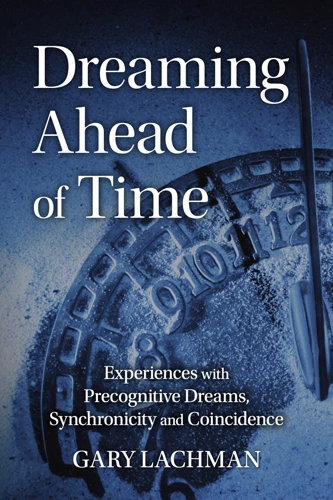Dreams have always been a fascinating and mysterious aspect of life. From fantastical adventures to surreal and unsettling scenarios, dreams often leave us wondering what their true meaning and purpose may be. But have you ever experienced a dream that seemed to predict events in the future? These types of dreams are known as precognitive dreams and are a subject of much debate and intrigue. It can be challenging to distinguish between regular dreams and precognitive ones, and that’s where this article comes in. In the following sections, we’ll explore the characteristics of both types of dreams, provide tips on how to differentiate between them, and delve into the possible reasons behind precognitive dreams. So, let’s dive into the fascinating world of dreams and uncover the mysteries that lie within.
What is a Regular Dream?

Many of us have experienced a dream that is so vivid and lifelike that it’s hard to believe it wasn’t real. These dreams can be so convincing that we may even wake up feeling disoriented or confused. But how do we differentiate between a regular dream and a precognitive dream? Regular dreams are a common occurrence during sleep and are often a reflection of our subconscious thoughts and emotions. Understanding what a regular dream is and its characteristics can help us distinguish it from a precognitive dream. To learn more about regular dreams, continue reading or check out this link.
Definition of a Regular Dream
A regular dream is the type of dream that most people experience on a regular basis. It is a sequence of thoughts, images, and sensations occurring in a person’s mind during sleep. According to the International Association for the Study of Dreams, a regular dream is defined as “a series of thoughts, images, and sensations occurring in a person’s mind during sleep.” These dreams usually occur during the REM (Rapid Eye Movement) stage of sleep and can last anywhere from a few seconds to over an hour.
There are different types of regular dreams such as:
| Type of Regular Dreams | Description |
|---|---|
| Nightmares | Scary dreams that often cause a person to wake up feeling anxious or afraid. |
| Lucid Dreams | Awareness that one is dreaming and the ability to control the dream. |
| Recurring Dreams | Dreams that repeat themselves with similar settings, characters, and actions. |
Regardless of the type of regular dream, they are generally believed to be a reflection of a person’s subconscious thoughts and feelings. The content of these dreams is often influenced by a person’s emotions, experiences, and memories.
It is also important to note that regular dreams are not usually predictive in nature. They do not offer insights into future events or provide any significant guidance for one’s life. In contrast, precognitive dreams are believed to have the ability to provide glimpses into future events.
To learn more about precognitive dreams, read on or visit /precognitive-dreams-history/, /science-pre-cognitive-dreams/, /precognitive-dreams-ability/, or /spiritual-significance-precog-dreams-cultures/.
Common Characteristics of a Regular Dream
Regular dreams are the most common type of dreams that people experience. They are the product of the brain’s activity during REM (rapid eye movement) stage of sleep. Regular dreams tend to be complex and surreal, often defying logic and gravity. Here are some common characteristics of a regular dream:
- Randomness: Regular dreams are often a jumble of unrelated thoughts and images that seem to have no connection to each other.
- Emotion: Emotions are an important part of regular dreams, and they can range from elation to fear to sadness.
- Memory: Regular dreams are often difficult to remember upon waking, and they may fade quickly from memory.
- Lack of control: In regular dreams, the dreamer often has little or no control over what is happening, and events may unfold without logical or coherent transitions.
- Sensory experiences: Regular dreams can be vivid and include all sorts of sensory experiences such as smell, taste, touch, and sound.
These characteristics can help differentiate a regular dream from a precognitive dream, which tends to have a different and often more specific set of characteristics. However, it is important to keep in mind that there is no hard and fast rule when it comes to dreams, and each individual’s dream experiences can vary greatly.
What is a Precognitive Dream?

Have you ever had a dream that felt like it was predicting the future? A dream that left you feeling like you had a glimpse into a future event or situation? If so, you may have experienced a precognitive dream. Precognitive dreams have long fascinated individuals, sparking discussions and debates about the potential abilities of the human mind. In this section, we will explore what defines a precognitive dream, its common characteristics, and what sets it apart from a regular dream.
Definition of a Precognitive Dream
A Precognitive Dream is a type of dream that is believed to provide insight into future events or situations. While regular dreams often involve random or fragmented images and experiences, precognitive dreams are characterized by a sense of clarity and coherence.
In a precognitive dream, the dreamer may see specific details or events that later come to fruition in waking life. These dreams can occur spontaneously or may be triggered by specific premonitions or intuitions.
The belief in precognitive dreams is not new and has been documented throughout history in various cultures and traditions. While some people believe that these dreams are purely coincidental or the result of subconscious processing, others believe that they are evidence of psychic abilities or spiritual connections.
It is important to note that not all dreams that seem to predict the future are necessarily precognitive. Sometimes, the events or situations experienced in the dream may be symbolic or metaphorical and require interpretation to understand their meaning.
Common Characteristics of a Precognitive Dream
Precognitive dreams are unique and may be difficult to identify without the proper knowledge. However, they do share some common characteristics that can help you differentiate them from regular dreams. Here are a few of the most notable ones:
- Vividness: Precognitive dreams tend to be more vivid and realistic than regular dreams. They often feel like you’re experiencing them in real life.
- Clarity: In a precognitive dream, the details are often crystal clear, and you may remember them vividly upon waking up.
- Emotion: Precognitive dreams tend to be emotionally charged. You may feel a sense of premonition or intuition that something significant is going to happen.
- Specificity: Precognitive dreams often include specific details, such as people’s names, places, dates, or events.
- Feeling of Deja Vu: When the events in the dream come true, you may experience a strong sense of deja vu, and feel like you’ve been there before.
- Prophetic Content: Precognitive dreams often contain prophetic content, meaning they predict future events, sometimes including disasters or tragedies.
Keep in mind that not all precognitive dreams will have all of these characteristics, and not all dreams with these characteristics will necessarily be precognitive. However, if you notice that your dreams often share these qualities, you may want to consider the possibility that you’re experiencing precognitive dreams.
How to Differentiate Between a Regular Dream and a Precognitive Dream

Do you often wake up wondering if the strange dream you just had was just a regular dream or a precognitive dream? Many people experience dreams that seem to predict future events, leaving them wondering whether there is any truth to these dreams. It can be difficult to differentiate between a regular dream and a precognitive dream, but there are a few steps you can take to determine what type of dream you experienced. By keeping a dream journal, looking for patterns or repeating themes, and trusting your gut and intuition, you can start to unravel the mysteries of your dreams and understand what they truly mean. Let’s delve deeper into the topic of differentiating between regular and precognitive dreams.
Keep a Dream Journal
One effective way to differentiate between regular dreams and precognitive dreams is to keep a dream journal. By writing down your dreams as soon as you wake up, you have a better opportunity to recall key details and analyze any patterns or recurring themes. Here are some tips for keeping a dream journal:
- Keep your journal and a pen or pencil next to your bed so you can easily access it when you wake up.
- Write down as much detail as you can remember, including people, places, and emotions felt during the dream.
- If you wake up in the middle of the night with a dream fresh in your mind, write it down before going back to sleep.
- Don’t worry about spelling or grammar – this journal is just for you and doesn’t need to be perfect.
- Review your dream journal regularly to look for patterns or recurring themes.
Keeping a dream journal can also help you identify if a dream is precognitive. You may notice that certain details or events from your dream eventually happen in waking life. By recording these instances in your journal, you can begin to recognize your own personal patterns of precognition.
Look for Patterns or Repeating Themes
One way to differentiate between a regular dream and a precognitive dream is to look for patterns or repeating themes in your dreams. These patterns may reveal underlying messages or signals that your subconscious is trying to communicate to you.
Here are some tips for looking for patterns or repeating themes in your dreams:
- Pay attention to the details: Note any recurring symbols, people, places, or objects in your dreams. These details could be clues to the underlying meaning of your dream.
- Reflect on your waking life: Think about any major events, emotions, or stressors in your life that could be connected to the themes or patterns in your dreams.
- Keep a dream journal: Writing down your dreams regularly can help you identify patterns and themes over time.
- Consider the emotions: Pay attention to the emotions you feel in your dreams. Are there common emotions that occur in your precognitive dreams that do not occur in your regular dreams?
- Seek outside perspectives: Share your dreams with trusted friends, family members, or a therapist to gain new insights and perspectives.
By paying attention to the patterns and themes in your dreams, you may be able to determine if they are regular or precognitive in nature. This can help you better understand your subconscious mind and the messages it may be trying to communicate to you.
Trust Your Gut and Your Intuition
Trusting your gut and intuition is a crucial step in differentiating between regular dreams and precognitive dreams. Precognitive dreams can often feel different than regular dreams, and they can leave a strong impression on your subconscious. Trusting your instincts can help you determine whether a dream was just a regular dream or if it might have some deeper, prophetic meaning.
To better understand the importance of trusting your gut, consider the following table:
| Regular Dream | Precognitive Dream |
|---|---|
| A regular dream may feel disjointed or unrealistic, lacking any clear message or sensation. | A precognitive dream may feel vivid, intense, and more realistic than a regular dream. It may give you a sense of knowing or understanding about a particular situation or event. |
| Regular dreams may feature random, unrelated imagery or events. | Precognitive dreams may contain specific details or symbols that are later revealed as significant in waking life. |
| Regular dreams may leave you feeling confused, scared, or disturbed. | Precognitive dreams may leave you feeling empowered, informed, or reassured about a particular situation or event. |
Trusting your gut and intuition can help you recognize when a dream might be more than just a regular dream. If you wake up feeling a strong sense of knowing or understanding about a particular situation, trust that feeling. Additionally, pay attention to any physical sensations you may have had during the dream, such as a feeling of lightness or heaviness, warmth or coldness, and any emotions that may have accompanied these sensations.
By trusting your gut and intuition, you can begin to identify patterns and themes within your dreams, which can help to reveal their deeper meanings. While not every dream will be precognitive, having the ability to recognize when a dream might have a prophetic message can be an incredibly powerful tool for personal growth and self-awareness.
Why Do Some People Experience Precognitive Dreams?

The phenomenon of precognitive dreams has baffled scientists, spiritualists, and the general population alike. It raises questions about the nature of time and consciousness, and whether our dreams are more than just a random firing of neurons. Many people have experienced this type of dream, leaving them wondering why they possess this unique ability. Some scientific theories and spiritual beliefs attempt to explain the occurrence of precognitive dreams, but it remains a mystery that continues to intrigue us.
Scientific Theories
There are several scientific theories that attempt to explain the phenomenon of precognitive dreams. Here are some of the most popular:
- Deja Vu Theory: According to this theory, when we experience something in waking life that is similar to a prior dream, our brains mistakenly interpret it as a memory instead of a dream. This could explain why some people feel as though they have already experienced a particular event.
- Unconscious Perception: This theory suggests that the mind can perceive and interpret sensory information on an unconscious level before it becomes conscious. Precognitive dreams could be the result of the mind interpreting this unconscious perception and presenting it to us in a dream form.
- Quantum Physics: Some researchers believe that precognitive dreams could be explained by quantum physics. The theory suggests that time may not be linear as we perceive it, and that we may be able to pick up on future events through the energy and vibrations around us.
- Neurological Activity: Studies have shown that some people’s brains are more active during sleep than others. This increased activity could lead to the brain processing information in a different way, allowing for the possibility of precognitive dreams.
While these theories may offer some explanation for why some people experience precognitive dreams, there is still much mystery surrounding the phenomenon. Further research and investigation may be necessary to fully understand the science behind it.
Spiritual and Metaphysical Beliefs
Many spiritual and metaphysical beliefs propose that everyone has the ability to access a higher level of consciousness through practices like meditation, prayer, and visualization. By tapping into this higher consciousness, some individuals believe that they can experience precognitive dreams and receive messages from the universe.
One of these beliefs is that precognitive dreams are a way for the universe to communicate important messages to us. Some folks believe that the universe communicates through symbolism and metaphor, and that dreams are a perfect vessel for these types of messages.
Another belief is that precognitive dreams are a sign of spiritual awakening or enlightenment. Some people believe that when they experience a precognitive dream, it is a sign that they are on the right path in their spiritual journey.
Others believe that precognitive dreams are a way for our souls to communicate with us. In this belief system, the soul is seen as a separate entity from the physical body, and is able to traverse different realms and dimensions. Precognitive dreams, then, are seen as a message from the soul realm to the physical realm.
These beliefs are not necessarily scientifically proven, but they provide an alternative perspective on the nature of precognitive dreams and the role they can play in our lives. Ultimately, whether or not you choose to subscribe to these beliefs, it’s important to acknowledge that dreams have the potential to offer us insight and guidance, regardless of their origin.
| Beliefs About Precognitive Dreams | Description |
|---|---|
| Messages from the universe | Some folks believe that precognitive dreams are a way for the universe to communicate important messages to us through symbolism and metaphor. |
| Sign of spiritual awakening/enlightenment | Some people believe that experiencing a precognitive dream is a sign that they are on the right path in their spiritual journey. |
| Communication from the soul realm | In this belief system, precognitive dreams are a message from the soul realm to the physical realm, as the soul is seen as a separate entity from the body. |
Examples of Precognitive Dreams

Many people have reported experiencing dreams that seem to predict the future or provide insight into events that they could not have otherwise known. These dreams, known as precognitive dreams, have sparked both scientific and spiritual interest. While there is still much debate around the phenomenon, there are numerous examples that have been shared throughout history. In this section, we will explore a few fascinating examples of individuals who have had precognitive dreams, as well as some famous cases that have captured the public’s attention.
Famous Cases of Precognitive Dreaming
Throughout history, there have been numerous famous cases of people who have reported experiencing precognitive dreams. Here are some examples:
- Abraham Lincoln: The former US president is said to have dreamt about his own death just a few days before he was assassinated.
- Martin Luther King Jr.: The civil rights leader had a dream the night before he was assassinated, in which he saw himself standing at the top of a mountain and looking out onto the promised land.
- Mark Twain: The well-known author had a dream in which he saw his brother Henry, who had been killed in a steamboat accident. The dream was so vivid that he cancelled his plans and didn’t take the same steamboat, ultimately avoiding the accident.
- Paul McCartney: The famous musician reportedly dreamt the melody for the hit song “Yesterday” before composing it.
- Abe Vigoda: The actor dreamt that he received a phone call informing him that he had been nominated for an Academy Award, a dream which later came true.
- Edgar Cayce: The American psychic is said to have had countless precognitive dreams throughout his life, including one in which he saw the stock market crash of 1929 several months before it happened.
These famous cases serve as a testament to the fact that precognitive dreams can happen to anyone, regardless of their profession, background, or beliefs. While not all precognitive dreams may come true, many individuals have reported significant coincidences between their dreams and future events. Ultimately, the true nature and purpose of precognitive dreams remain a mystery, but their impact on people is undeniable.
Personal Experiences Shared by Others
People all around the world have shared their personal experiences with precognitive dreams. Many claim to have experienced a sense of déjà vu when their dream came true later in life. Some have even reported dreaming about events that they couldn’t have possibly known about.
One personal experience that stands out is the story of a woman named Mary. Mary dreamt that her son was in a car accident and woke up in a panic. The dream was so vivid that she called her son immediately to make sure he was okay. He was fine, and Mary forgot about the dream. A few weeks later, her son was in a car accident, and it turned out to be the exact same one that she had dreamed about.
Another example is the story of a man named John. John had a dream that he was in a plane crash and woke up in a cold sweat. He couldn’t shake the feeling that it was more than just a regular dream. He decided to change his travel plans and canceled his upcoming flight. A few days later, the news reported a plane crash on the exact same route and flight number that he had been scheduled to take.
These personal experiences highlight the potential reality of precognitive dreams and the importance of paying attention to them. If you have a dream that feels like more than just a regular dream, it’s always best to take it seriously and see if there are any potential warning signs.
Table: Personal Experiences with Precognitive Dreams
| Name | Dream Content | Outcome |
|---|---|---|
| Mary | Dream of son in car accident | Son was in the exact same car accident a few weeks later |
| John | Dream of being in a plane crash | Avoided the exact same flight that ended up crashing a few days later |
| Sarah | Dream of a family member getting sick | Family member was diagnosed with an illness shortly after |
These personal experiences show that it’s important not to ignore our dreams and to take the time to reflect on what they might mean. Dreams can provide us with important insights and information about our lives, and precognitive dreams, in particular, can help us avoid potential danger or make significant life changes.
Interpreting Your Dreams
Understanding the meaning behind your dreams can be a perplexing and intriguing experience. While some dreams may be purely random and insignificant, others may reveal deeper emotions, thoughts, and fears. By interpreting your dreams, you can gain insight into your inner self and potentially uncover hidden meanings and messages that your subconscious mind is trying to communicate. In this section, we will explore the importance of dream interpretation and provide tools and resources for analyzing the symbolism and imagery present in your dreams.
The Importance of Dream Interpretation
Dream interpretation holds significant importance in understanding our emotions, thoughts, and unconscious mind. Dreams can be seen as a window into our innermost selves, offering insight into our fears, desires, and past experiences. However, without proper interpretation, the meaning of dreams can be lost or misinterpreted. It is essential to understand the significance of dream interpretation.
To understand and process emotions: Dreams offer a safe space for processing emotions that one may repress or not even be aware of in their waking life. Understanding the meanings behind our dreams can help identify suppressed emotions and provide a new perspective on unresolved issues.
To improve mental health: Dreams can offer insight into underlying mental health concerns such as anxiety, depression, and trauma. Understanding the messages conveyed in dreams can help individuals work through these concerns and improve their overall mental health.
To gain clarity and insight: Dreams can provide clarity on one’s goals, ambitions, and direction in life. Through interpretation, individuals can gain insight into their subconscious mind and potential obstacles in their waking life.
To enhance self-awareness: Interpretation of dreams helps enhance self-awareness by shedding light on one’s behavior, attitudes, and patterns. This understanding inspires self-reflection, self-growth, and self-improvement.
To find meaning and purpose: Interpreting dreams can offer a sense of purpose for individuals by giving them a new perspective on their life journey. Dreams can provide a sense of direction or highlight significant turning points in one’s life.
Dream interpretation is crucial for self-awareness, mental health, gaining clarity, and understanding our deeper selves. It can serve as a tool for personal growth and self-improvement.
Tools for Dream Interpretation
When it comes to interpreting your dreams, there are several tools that you can use to help you gain a deeper understanding of their hidden meanings. Here are a few options to consider:
- Dream Dictionaries: These are books or online resources that provide a list of common dream symbols and their possible interpretations. While these can be helpful for giving you a starting point, remember that the meaning of a symbol may vary depending on your personal associations and experiences.
- Journaling: Keeping a dream journal can be a powerful tool for interpreting your dreams. By recording your dreams in detail, you may start to notice patterns or themes that can provide insight into your waking life.
- Dream Workshops: Attending a dream workshop led by a trained professional can be a great way to explore your dreams in a safe and supportive environment. These workshops may include activities like dream sharing, guided meditation, or creative exercises.
- Therapy: If you are struggling with recurring or emotionally intense dreams, working with a therapist who specializes in dream analysis may be helpful. They can help you explore the symbolism and underlying emotions in your dreams as a way to gain insight and healing.
- Meditation: Practicing mindfulness or meditation can help you develop a deeper sense of self-awareness, which in turn can aid in dream interpretation. By staying present and open to your inner experiences, you may be able to more easily access the insights and messages contained in your dreams.
Remember that dream interpretation is a highly personal process, and there is no one “right” way to do it. Experiment with different tools to see which ones resonate with you, and always approach your dreams with an open mind and a willingness to explore their hidden meanings.
Working with a Professional Dream Interpreter
When it comes to dream interpretation, there are times when consulting a professional dream interpreter may be beneficial. These individuals are well-versed in the symbolism and meanings behind dreams and can offer insight into the messages your subconscious may be trying to convey. Here are some tips for working with a professional dream interpreter:
| Research: | Do your research before choosing a dream interpreter. Look for someone who is reputable, experienced, and has formal training or certification in dream analysis. |
| Establish rapport: | It’s important to feel comfortable with the interpreter you choose. Establish rapport and build trust with them to create a safe space where you can share your dreams without hesitation. |
| Be honest: | Share as much information as possible about yourself and your emotional state at the time of the dream. This will help the interpreter provide a more accurate analysis. |
| Ask questions: | Don’t be afraid to ask questions and clarify any interpretations that you may not fully understand. The goal is to gain a deeper understanding of yourself and your dreams. |
| Remember interpretation is subjective: | Keep in mind that dream interpretation is subjective and depends on the individual’s personal experiences and associations. The dream interpreter is providing insight based on their own interpretation of the symbolism present in your dreams. |
Working with a professional dream interpreter can offer a unique perspective on your dreams and provide insight into your subconscious thoughts and feelings. Just be sure to do your research, establish a rapport, be honest, ask questions, and remember that interpretation is subjective.
Conclusion
In conclusion, differentiating between a regular dream and a precognitive dream can be challenging. However, paying attention to the characteristics of each and utilizing various tools and methods, such as keeping a dream journal and trusting your intuition, can aid in distinguishing one from the other. It is important to note that experiencing a precognitive dream is not uncommon and there are various scientific and metaphysical theories surrounding the phenomenon.
Interpreting your dreams and understanding their meanings can offer valuable insight into your subconscious and help in personal growth and self-discovery. There are many techniques and tools available for dream interpretation, including using symbolism and archetypes. Consulting with a professional dream interpreter can also offer further clarity and guidance.
In the end, whether you believe in the science behind precognitive dreams or prefer to attribute them to spiritual or metaphysical beliefs, our dreams hold a significant place in our lives and can offer insight into our deepest desires, fears, and aspirations. Embracing the power of our dreams and learning to decipher their meanings is a valuable tool in achieving personal growth, inner peace, and a deeper understanding of ourselves.
Frequently Asked Questions
What does it mean if I have recurring dreams?
Recurring dreams can indicate unresolved issues or emotions that need attention in your waking life.
Can dreams predict the future?
Precognitive dreams suggest that we may have the ability to perceive events or information beyond the scope of our five senses, but it is not a proven phenomenon.
Why do we forget our dreams so quickly?
Our brain prioritizes processing relevant information for our survival, so it tends to discard irrelevant information, such as our dreams.
Can medication affect the content of our dreams?
Yes, certain medications can affect the content and frequency of our dreams, such as antidepressants, which may reduce or eliminate dreaming altogether.
Is lucid dreaming the same as precognitive dreaming?
No, lucid dreaming is when you become aware that you are dreaming and can control the dream, while precognitive dreaming suggests the ability to perceive future events in dreams.
What is sleep paralysis?
Sleep paralysis is a feeling of being unable to move or speak while falling asleep or waking up, often accompanied by hallucinations and a sense of pressure on the chest.
Can we learn to control our dreams?
Yes, with practice and certain techniques, such as reality checks and dream journaling, we can increase our ability to control and influence our dreams.
Do all cultures interpret dreams the same way?
No, dream interpretation varies across cultures and may be influenced by religious, spiritual, or personal beliefs and experiences.
Can dream symbols be interpreted universally?
While some symbols may have a common interpretation across cultures or within a specific context, their meaning can also be highly personal and subjective.
Can dream interpretation be used to make life decisions?
While dream interpretation can offer insight and guidance, it is important to also consider practical and rational factors when making important life decisions.








